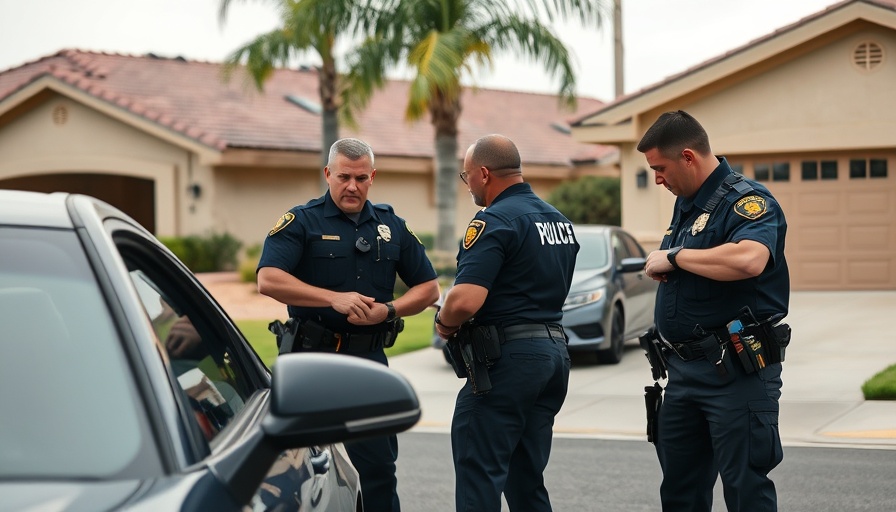
Understanding the Current ICE Surge in Southern California
As the pace of ICE and Border Patrol operations escalates in Southern California, many communities are left in fear. Recent reports detail troubling encounters where agents aggressively detained individuals in public spaces— from a Home Depot in Encinitas to a Gardener in South Los Angeles. This surge, heightened amidst community protests and the ongoing debate about immigration reform, raises pivotal questions about both safety and civil rights.
ICE's Targeted Approach: Who is Affected?
Everyday environments that are meant to be safe havens, like grocery stores and neighborhoods, have turned into sites of apprehension for many residents. Just yesterday, for instance, chilling footage emerged of an encounter at a Stater Bros in Ontario where minors faced intimidation from ICE agents. One U.S. citizen, for example, shared harrowing details of his arrest, claiming excessive force was used, leaving him hospitalized. These cases highlight a shocking reality—daily life is deeply intertwined with fear for those who are undocumented or even for U.S. citizens mistaken for targets.
Social Connection: The Impact on Local Communities
Communities of color are feeling the brunt of these raids, as they foster an environment of caution and anxiety. This emotional toll can lead to isolation, affecting mental health and community cohesion. The ripple effects of fear alter how families interact with services, police, and even healthcare providers, deepening the stigmatization of immigrant populations.
Economic Motivations Behind Raids: An Unspoken Reality
Many are questioning why ICE disproportionately targets day laborers and farm workers. Reports suggest that private prisons use these individuals for cheap labor, paying as little as $1 for a grueling day's work, while charging exorbitant fees for basic necessities within the detention centers. These alarming profit-driven incentives point to an economic apparatus that exploits vulnerable individuals, underscoring the morally complex landscape surrounding immigration enforcement.
A Glimpse into Life Inside Detention Facilities
The harsh realities of immigration detention centers are coming to light. Take Javier Diaz Santana, a DACA recipient who thought he was safe due to his Real ID before being swept into a detention center in El Paso. His story serves as a cruel reminder that even lawful residents are at risk, trapped in a system that appears increasingly punitive and devoid of empathy. Advocates are fervently speaking out against these practices, emphasizing the need for reform in how our country handles immigration and deportation processes.
The Broader Debate: Military Bases as Detention Facilities?
With current detention centers overwhelmed, Lulac reports discussions are emerging around utilizing military bases to house detainees. Critics warn that this could lead to inhumane conditions reminiscent of historical detainment camps. This proposition raises crucial ethical questions about our duty to treat every individual with dignity, regardless of their immigration status.
Future Predictions: What Comes Next?
As ICE continues its aggressive tactics, what does the future hold? Community leaders and activists are rallying to push back against these trends. Protests and advocacy campaigns are gearing up, hoping to influence policy changes that prioritize humane treatment of individuals. However, the tension between enforcement and community safety remains high, making the need for a comprehensive immigration reform more urgent than ever.
Your Role in the Conversation: Take Action
It's essential for communities to engage in these conversations around immigration reform. Continued advocacy can lead to meaningful changes in legislation that respects the rights of all. Consider participating in local protests, signing petitions, or reaching out to representatives to voice your support for humane immigration practices.
Ultimately, every voice matters in this ongoing dialogue. We can collectively work toward an environment that values human dignity and promotes social wellness for all individuals, regardless of their status. Let’s not remain silent.
 Add Row
Add Row  Add
Add 




Write A Comment